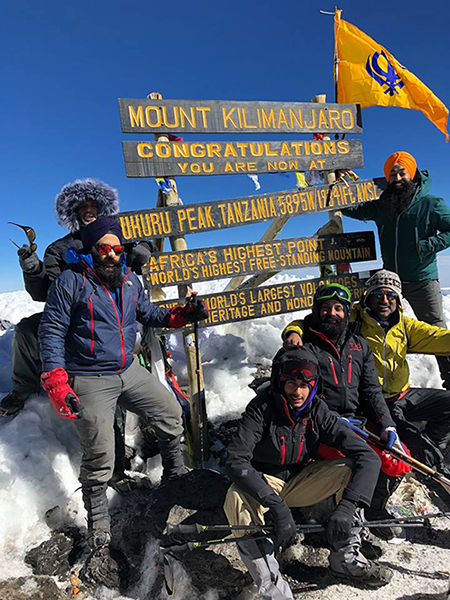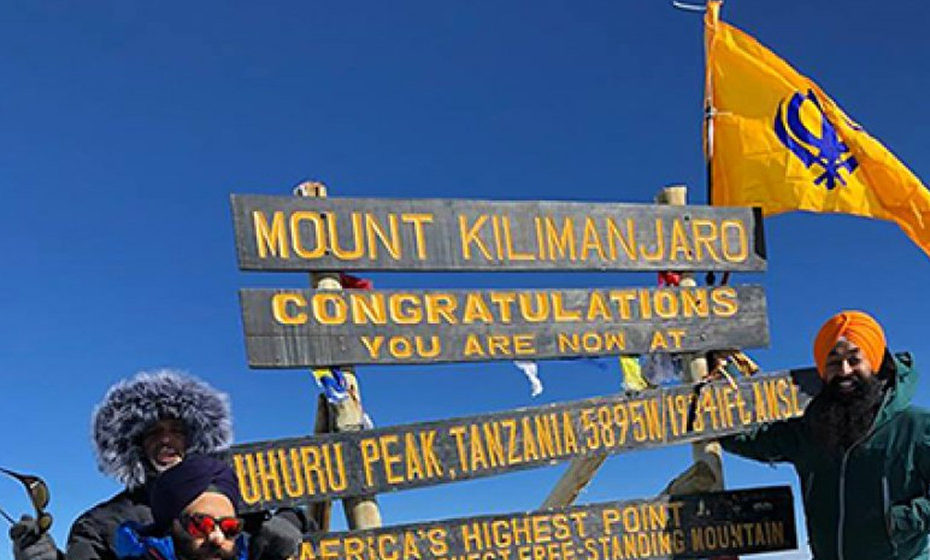By Vidya Pradhan
Mount Kilimanjaro, a place vivid in history, culture, and popular imagination. A group of Sikh hikers had the amazing experience of hoisting the Nishan Sahib at the summit of Africa on 29th July 2018. Using the popular Machame route, it took them seven days of arduous hiking to reach the summit on the day of the lunar eclipse.
The group consisted of six friends from Vancouver, British Columbia, and represented the spectrum of generations – from Baby Boomers to Gen X, Y, Millennials, and Gen Z.

For Satwinder Singh, an engineering entrepreneur, it was one more tick off his bucket list. “As an avid hiker, I always want to up the game each time,” he says.
Sher Singh, who at 15 was the youngest of the group, looks back at the whole experience with the typical teenager’s insouciance! “Many people climb the mountain every day,” he says, “There were at least a couple of hundred people that summited with us, and many people accomplish the same thing we did.” The subtext to his experience seems to be, What’s the big deal?
For Amar Virk, one of the principal organizers of the trip, the adventure held a lot more meaning and resonance. “It is vitally important for us to experience discomfort in our lives,” he philosophizes. “In hindsight, those moments of feeling uncomfortable become our greatest gifts.” He points out that Sikh history is draped in that resilience. The Sikh journey, whether within India or migratory, has been one of climbing both real and metaphorical mountains. “Overcoming obstacles gives us insight and allows for moments of greater introspection and perspective of the larger scheme at play.”
Amar and his friends asked this preemptive question of themselves nearly a decade ago: How can we develop the self-governance and mastery needed to live in a mindset of thriving (not just surviving) in the most difficult of times? To him, the answer was to methodically push physical, mental, and emotional boundaries. The trip to Kilimanjaro seemed to embody this desire to live on the edge. Even adding the youngster Sher Singh to the group was a way to fulfil the responsibility to the sangat to help develop the social and community capital of the panth, and to create future change makers.
Every step of the way to Kilimanjaro, Amar felt the affirmation of his thinking behind the trip. In Arusha, Tanzania, the group came across old carved artisan Punjabi doors that were in a private collection. The older members of the group, born in Punjab, shared the richness of the Sikh language, history, and culture with the others. While hiking for long stretches, the conversation turned to our dopamine driven society, our need for quick fixes and instant gratification. Far away from both their physical home of British Columbia and their spiritual home in Punjab, the friends nevertheless saw the similarities in the rampant drug use in the two communities and mourned. Other serious conversations centered around the warping of society by the advent of social media.
But the thing that stood out the most, for Amar, was the lack of other Sikh faces among the many others who were also seeking to summit Kilimanjaro. “We as a community have been blessed with the physical capacity to carry out such difficult journeys, but it seems to me that we never actually do so anymore. Why is this?”
To Amar, the absence of fellow Sikhs at Kilimanjaro was a stark reminder that somewhere, in the search for material prosperity, the community has lost the ability for search for a more balanced, a more quality life. “Physiology and psychology go hand in hand for true healing,” he says. “Fresh air and the summit of any mountain can provide perspective for a lot of things. All it takes, is one person to have an idea, start planning, and watch the momentum take over.”
To the experienced hikers, the journey was hard but rewarding. Apart from a few bouts of altitude sickness, the group stayed in good health and spirits throughout the week of climbing. Laughs Satwinder, “One of the hikers we encountered was taking Viagra to help with the altitude – it’s the first time I’ve ever heard of this use!”
As the intrepid band of friends approached the summit, named “Uhuru” or “Freedom” in Swahili, they took a moment to be mindful and give thanks for being able to experience the hike, the five climate zones they had passed through, and the friendship and camaraderie that made this magnificent adventure even more worthwhile. Two quotes by Nelson Mandela encapsulate the trip for Amar: “After climbing a great hill, one only finds that there are many more hills to climb,” and “It always seems impossible until it’s done.”

